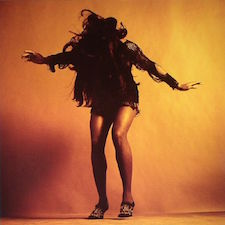As a duo, Alex Turner and Miles Kane get to play dress up. Turner spends most of his time fronting Arctic Monkeys, so The Last Shadow Puppets is his part-time job, a new guise to throw on and trot around in. Kane, equal partner in the effort, gets to don a sharp [track]suit too. Throughout their second album, that performative style and the awareness thereof supersedes any substance: poor actors with a shit script.
When acting is good, it can plumb the depths of emotion, make you connect and feel things you have never yourself experienced. In fact, all art could be seen as involving some amount of acting – it has an audience who enter with their own perspective, and was made to please at least some portion of that audience. But we’ve all seen bad acting, times where we say something is no longer “believable,” the precise moment when the magic is gone and we see all the smoke and mirrors clearly for what they are. The artifice is laid bare, leaving behind no spark or spirit or depth, just workmanlike shtick. The curtains close after Everything You’ve Come To Expect, spoiled tomatoes litter the floorboards, and wishes to “break a leg” are entirely literal.
The comparison to actors isn’t just a literary device. Last Shadow Puppets is a dramatic project: their chosen moniker relates to theatrics and, more to the point, this album sounds influenced by actors. Jacque Brel, Serge Gainsbourg, Frank Sinatra, Elvis – they all act as touch-points. The songs sound more like those of the French men, and the Americans stand more as spiritual ancestors, ladies’ men with rough edges. What do they all have in common? They’ve all spent plenty of time reading scripts. The songs here are connected, too, in purpose, production, and intention, though they don’t necessarily sound alike. They’re different scenes strung together by a thematic thread. ‘Aviation’ opens on a rough post-apocalyptic dirt road, ‘Dracula Teeth’ is the ‘70s James Bond funk, and ‘Miracle Aligner’ scores the romantic ’60s gag. They’re all grand, big, panoramic, opening 11 different movies with the same character lounge lizarding his way through filmic genres. Hell, they even threw on a bonus track called ‘The Bourne Identity’, though rather than induce feverish action sequences, it’ll more likely make you wish you had dissociative amnesia.
If a bad actor can ruin a good script, a bad actor can completely bury a bad script. Throughout Everything You’ve Come to Expect, Turner and Kane are cast in a light of seductive swank, and yet their script belies any of the lounge cool of Gainsbourg and his ilk. "Baby we ought to fuck seven years of bad luck out the powder room mirror," goes Turner on ‘Sweet Dreams, TN’. James Ford (producer of Foals, HAIM, Florence and the Machine, and more) pounds out a grand waltz on the drums, while the orchestra, arranged and conducted by Owen Pallett, curls at the edges. The set is dressed well, but you can guess he’s not – as if setting up a stage with a lush velvet curtain and ornate furniture, then letting a fella in a pleather jacket and yellowed undies swagger onstage with a no-bullshit smirk.
Or maybe he’s just the sloppy drunk at the pub that decided to read his romantic musings off a napkin, proud of his witticisms and leisure suit in equal measure. "It’s love like a tongue in a nostril," he slobbers. The juxtaposition would be funny if there were any hint of self-awareness to Turner’s grotesqueries as paired with Pallett’s soaring violins. The Kane-sung ‘Pattern’ similarly lacks in connection, the watery cabaret strings and airy guitar sunk by the whining nonsense of the lyrics. "And I slip and I slide like a spider on an icicle, frozen in time," Kane offers, failing to remotely compete with the charm of the arrangement for the spotlight.
That fact is particularly upsetting: Pallett’s work is largely excellent, fitting the bravado and tone of his collaborators. ‘Bad Habits’ is a highlight for that reason; Flashdance energy in the rhythm section, wiry horror violin stabs, and bass-heavy piano. The album is at its best when the margins are jammed full – tinny tambourine here, guitar feedback there, a wash of cellos dipping into the mix. The ‘60s pop swoon of ‘Miracle Aligner’, though, is the exception to that rule, the one point at which they refine their sound to a pure simplicity, unsullied by rough-hewn lyrics. On that track, Turner sounds like a tipsy Father John Misty, too far in his cups to remember to do the whole “meta commentary” thing, but still sounding pretty good – the noir lead guitar line, splashy cymbals, and plodding bass set him up to succeed, and he does. On the opener ‘Aviation’, Kane similarly manages to hold onto the reins for just long enough. He sounds a bit like The Walkmen’s Hamilton Leithauser fronting The Cure, but the droning post-punk guitars, falsetto harmonies, and shadowy violins push and pull masterfully.
“I’m a liar, I’m a cheat, a leech, a thief/ The outside looks no good and there ain’t nothing underneath,” Kane offers on ‘Used To Be My Girl’, a track somehow both dull and busy. There are plenty of villains – and bad actors, for that matter – that pull off that approach: “Look how bad I am!” You want to look closer, to lean in and find out just what makes that badness tick. It’s true, there’s some humanity in Kane and Turner’s vulnerability; they write lines like “Gimme all your love so I can fill you up with hate” unafraid of, or even excited by, the light it casts them in. But then when you lean in to learn more, there’s nothing more to learn.


